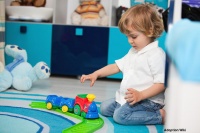Difference between revisions of "Adoption Parenting"
| Line 3: | Line 3: | ||
==[[Adoption Parenting: Newborn and Infant]]== | ==[[Adoption Parenting: Newborn and Infant]]== | ||
[[File:Shutterstock 130044074.jpg|thumb|left|200px]] | [[File:Shutterstock 130044074.jpg|thumb|left|200px]] | ||
| − | + | ====[[Characteristics of Newborns and Infants]]==== | |
| − | ====[[Characteristics of Newborns]]==== | + | It’s often so difficult for us to determine when a child has advanced from one stage to another, for instance, from a newborn to an infant. A child is generally considered a newborn from birth to 4 weeks. |
| − | + | ||
| − | + | ||
| − | + | ||
====[[What to Expect the First Year]]==== | ====[[What to Expect the First Year]]==== | ||
| − | + | The primary task of a baby is to develop a sense of trust in the world and come to view it as a place that is predictable and reliable. | |
| − | + | <br/> | |
==[[Adoption Parenting: Toddler]]== | ==[[Adoption Parenting: Toddler]]== | ||
[[ File:Shutterstock 142678021.jpg|thumb|left|200px]] | [[ File:Shutterstock 142678021.jpg|thumb|left|200px]] | ||
====[[Characteristics and Traits of Toddlers]]==== | ====[[Characteristics and Traits of Toddlers]]==== | ||
| − | + | Toddlerhood is the time parents seem to find their children the most challenging, as their “babies” struggle between complete dependence and separation. | |
====[[Typical Two-Year-Old Behavior]]==== | ====[[Typical Two-Year-Old Behavior]]==== | ||
| − | + | Toddlers continue the attachment and separation cycle in more sophisticated ways in the second year. | |
| − | + | <br/> | |
==[[Adoption Parenting: Preschool]]== | ==[[Adoption Parenting: Preschool]]== | ||
[[File:Shutterstock 84708676.jpg|thumb|160px|left]] | [[File:Shutterstock 84708676.jpg|thumb|160px|left]] | ||
| − | ====[[Adoption and Child Development]]==== | + | ====[[Preschool: Adoption and Child Development| Adoption and Child Development]]==== |
| − | ====[[Communication About Adoption]]==== | + | It is important to understand the typical developmental tasks and needs of preschoolers, as well as how adoption-related experiences may affect your child. |
| − | ====[[Discipline Considerations]]==== | + | ====[[Preschool: Communication About Adoption|Communication About Adoption]]==== |
| − | + | Parents who project an attitude of acceptance and comfort with adoption are better able to help their children explore their own feelings and fears. | |
| + | ====[[Preschool: Discipline Considerations| Discipline Considerations]]==== | ||
| + | The purpose of discipline is to teach, re-teach, and assist children in developing their own internal controls. | ||
<br/><br/> | <br/><br/> | ||
==[[Adoption Parenting: Grade School]]== | ==[[Adoption Parenting: Grade School]]== | ||
[[File:Shutterstock 83070964.jpg|thumb|200px|left]] | [[File:Shutterstock 83070964.jpg|thumb|200px|left]] | ||
| − | ====[[ | + | ====[[Grade School: Understanding Child Development and the Impact of Adoption| Understanding Child Development and the Impact of Adoption]]==== |
| − | ====[[Communicating about Adoption]]==== | + | School-aged children go through many significant developmental changes. It is important for parents to understand the typical tasks and needs of school-aged children as well as how adoption-related experiences may affect children. |
| − | ====[[Disciplining Effectively]]==== | + | ====[[Grade School: Communicating about Adoption| Communicating About Adoption]]==== |
| − | ====[[Improving Your Child's School Experience]]==== | + | Parents who feel good about adoption, are comfortable talking about it, and can openly acknowledge their child’s feelings are best able to help their children do the same. |
| − | ====[[Seeking Help for Mental Health Concerns]]==== | + | ====[[Grade School: Disciplining Effectively| Disciplining Effectively]]==== |
| + | The purpose of discipline is to teach children acceptable behavior and how to develop their own internal controls. Discipline should take into account your child’s abilities, learning styles, and family history. | ||
| + | ====[[Grade School: Improving Your Child's School Experience| Improving Your Child's School Experience]]==== | ||
| + | Being [[adopted]] can affect your child’s school experience. Peers may pose innocent questions that cause hurt feelings, or they may tease an [[adopted]] child about being [[adopted]]. | ||
| + | ====[[Grade School: Seeking Help for Mental Health Concerns| Seeking Help for Mental Health Concerns]]==== | ||
| + | Adoptive families, like other families, sometimes need help to address mental health concerns. Sadness, anger, and behavior challenges are normal as children in grade school learn more about their family histories and come to terms with adoption. | ||
==[[Adoption Parenting: Preteen]]== | ==[[Adoption Parenting: Preteen]]== | ||
[[File:Shutterstock 201847741.jpg|thumb| 200px|left]] | [[File:Shutterstock 201847741.jpg|thumb| 200px|left]] | ||
| − | ====[[A Time of Changes]]==== | + | ====[[Preteen: A Time of Changes| A Time of Changes]]==== |
| − | ====[[Psychological Identification]]==== | + | As children reach 10, 11, and 12, they seem to become different people. |
| − | + | ====[[Preteen: Psychological Identification| Psychological Identification]]==== | |
| + | If your child has had several homes before yours, there is often a brief honeymoon period where s/he will try to be perfect to ensure your love. But soon the sense of [[loss]], hurt, and anger surfaces. | ||
| + | <br/><br/> | ||
==[[Adoption Parenting: Teenage Years]]== | ==[[Adoption Parenting: Teenage Years]]== | ||
[[File:Shutterstock 175066559.jpg|thumb| 200px|left]] | [[File:Shutterstock 175066559.jpg|thumb| 200px|left]] | ||
| − | ====[[Understanding Teenage Development and the Impact of Adoption]]==== | + | ====[[Teenage Years: Understanding Teenage Development and the Impact of Adoption| Understanding Teenage Development and the Impact of Adoption]]==== |
| − | ====[[Communicating with Your Teenager About Adoption]]==== | + | Thirteen- to nineteen-year-olds experience rapid physical and hormonal growth. |
| − | ====[[Helping Your Teenager Communicate with Others About Adoption]]==== | + | ====[[Teenage Years: Communicating with Your Teenager About Adoption| Communicating with Your Teenager About Adoption]]==== |
| − | ====[[Disciplining Effectively]]==== | + | [[Adopted]] teenagers wonder about their birth families and think about adoption more than most parents realize. They need parents who are comfortable talking about adoption, who aren’t threatened or hurt by the discussion, and who can help answer their questions and discover information about their pasts. |
| − | ====[[Preparing Your Teenager for Adulthood]]==== | + | ====[[Teenage Years: Helping Your Teenager Communicate with Others About Adoption| Helping You Teenager Communicate with Others About Adoption]]==== |
| − | ====[[Seeking Help for Mental Concerns]]==== | + | Being [[adopted]] can affect peer interactions. Teens are capable of more sophisticated understanding and discussions about adoption, but they can be quite narrow in their judgments. |
| + | ====[[Teenage Years: Disciplining Effectively| Disciplining Effectively]]==== | ||
| + | As teenagers assert their emerging identities and independence, while also navigating peer pressures, they frequently will test the boundaries of family rules. | ||
| + | ====[[Teenage Years: Preparing Your Teenager for Adulthood| Preparing You Teenager for Adulthood]]==== | ||
| + | An important part of parenting teenagers is creating the conditions in which they can master adult tasks and take on greater independence. | ||
| + | ====[[Teenage Years: Seeking Help for Mental Concerns| Seeking Help for Mental Concerns]]==== | ||
| + | For many [[Adopted Persons|adopted persons]], growing up in an adoptive family involves some additional complications and challenges. | ||
==[[Adoption Parenting: Young Adults]]== | ==[[Adoption Parenting: Young Adults]]== | ||
[[File:Shutterstock 58771618.jpg|thumb|200px|left]] | [[File:Shutterstock 58771618.jpg|thumb|200px|left]] | ||
| − | ====[[Postadoption Issues]]==== | + | ====[[Young Adults: Postadoption Issues| Postadoption Issues]]==== |
| − | ====[[Openness, Searching, and Access to Family History]]==== | + | [[Adopted Persons|Adopted persons]] may deal with a range of issues at different points in their lives. |
| − | ====[[Managing Adoption Issues]]==== | + | ====[[Young Adults: Openness, Searching, and Access to Family History| Openness, Searching, and Access to Family History]]==== |
| − | ====[[Additional Resources]]==== | + | Being placed for adoption does not necessarily mean an [[adopted]] person will never be able to contact his or her birth parents again. |
| + | ====[[Young Adults: Managing Adoption Issues| Managing Adoption Issues]]==== | ||
| + | Most [[adopted]] adults overcome any adoption-related issues they experience during childhood and adolescence and are as well-adjusted as nonadopted persons. | ||
| + | ====[[Young Adults: Additional Resources| Additional Resources]]==== | ||
| + | Several nonprofit membership [[organizations]] provide education, advocacy, and support for families touched by adoption. | ||
<br/> | <br/> | ||
Revision as of 18:44, 21 August 2014
Contents
Ages and Stages
Adoption Parenting: Newborn and Infant
Characteristics of Newborns and Infants
It’s often so difficult for us to determine when a child has advanced from one stage to another, for instance, from a newborn to an infant. A child is generally considered a newborn from birth to 4 weeks.
What to Expect the First Year
The primary task of a baby is to develop a sense of trust in the world and come to view it as a place that is predictable and reliable.
Adoption Parenting: Toddler
Characteristics and Traits of Toddlers
Toddlerhood is the time parents seem to find their children the most challenging, as their “babies” struggle between complete dependence and separation.
Typical Two-Year-Old Behavior
Toddlers continue the attachment and separation cycle in more sophisticated ways in the second year.
Adoption Parenting: Preschool
Adoption and Child Development
It is important to understand the typical developmental tasks and needs of preschoolers, as well as how adoption-related experiences may affect your child.
Communication About Adoption
Parents who project an attitude of acceptance and comfort with adoption are better able to help their children explore their own feelings and fears.
Discipline Considerations
The purpose of discipline is to teach, re-teach, and assist children in developing their own internal controls.
Adoption Parenting: Grade School
Understanding Child Development and the Impact of Adoption
School-aged children go through many significant developmental changes. It is important for parents to understand the typical tasks and needs of school-aged children as well as how adoption-related experiences may affect children.
Communicating About Adoption
Parents who feel good about adoption, are comfortable talking about it, and can openly acknowledge their child’s feelings are best able to help their children do the same.
Disciplining Effectively
The purpose of discipline is to teach children acceptable behavior and how to develop their own internal controls. Discipline should take into account your child’s abilities, learning styles, and family history.
Improving Your Child's School Experience
Being adopted can affect your child’s school experience. Peers may pose innocent questions that cause hurt feelings, or they may tease an adopted child about being adopted.
Seeking Help for Mental Health Concerns
Adoptive families, like other families, sometimes need help to address mental health concerns. Sadness, anger, and behavior challenges are normal as children in grade school learn more about their family histories and come to terms with adoption.
Adoption Parenting: Preteen
A Time of Changes
As children reach 10, 11, and 12, they seem to become different people.
Psychological Identification
If your child has had several homes before yours, there is often a brief honeymoon period where s/he will try to be perfect to ensure your love. But soon the sense of loss, hurt, and anger surfaces.
Adoption Parenting: Teenage Years
Understanding Teenage Development and the Impact of Adoption
Thirteen- to nineteen-year-olds experience rapid physical and hormonal growth.
Communicating with Your Teenager About Adoption
Adopted teenagers wonder about their birth families and think about adoption more than most parents realize. They need parents who are comfortable talking about adoption, who aren’t threatened or hurt by the discussion, and who can help answer their questions and discover information about their pasts.
Helping You Teenager Communicate with Others About Adoption
Being adopted can affect peer interactions. Teens are capable of more sophisticated understanding and discussions about adoption, but they can be quite narrow in their judgments.
Disciplining Effectively
As teenagers assert their emerging identities and independence, while also navigating peer pressures, they frequently will test the boundaries of family rules.
Preparing You Teenager for Adulthood
An important part of parenting teenagers is creating the conditions in which they can master adult tasks and take on greater independence.
Seeking Help for Mental Concerns
For many adopted persons, growing up in an adoptive family involves some additional complications and challenges.
Adoption Parenting: Young Adults
Postadoption Issues
Adopted persons may deal with a range of issues at different points in their lives.
Openness, Searching, and Access to Family History
Being placed for adoption does not necessarily mean an adopted person will never be able to contact his or her birth parents again.
Managing Adoption Issues
Most adopted adults overcome any adoption-related issues they experience during childhood and adolescence and are as well-adjusted as nonadopted persons.
Additional Resources
Several nonprofit membership organizations provide education, advocacy, and support for families touched by adoption.
Visit Special Needs to find out more about physical, mental, and emotional disabilities.
Return to Adoption Wiki






